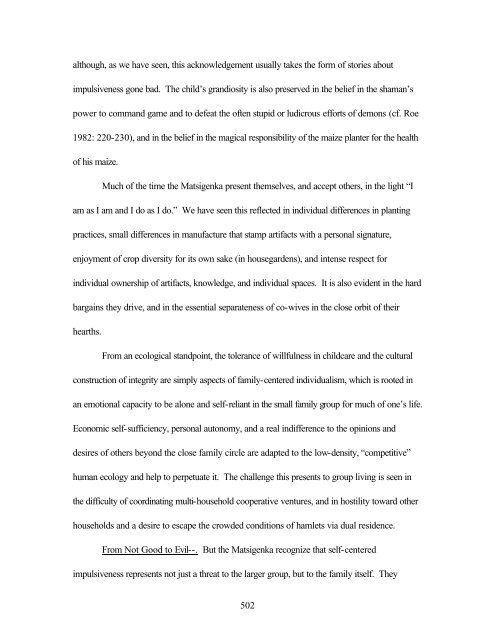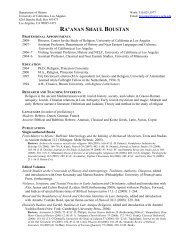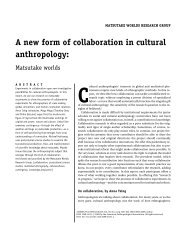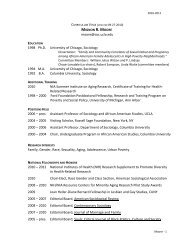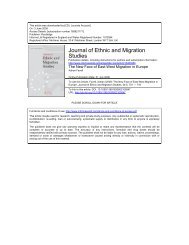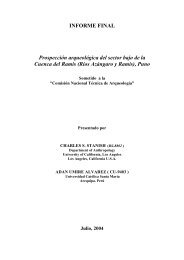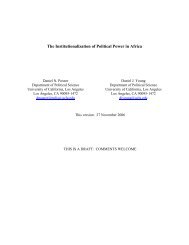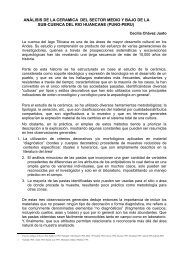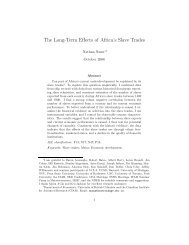433 Chapter Seven Cosmos For the Matsigenka of Shimaa, kameti ...
433 Chapter Seven Cosmos For the Matsigenka of Shimaa, kameti ...
433 Chapter Seven Cosmos For the Matsigenka of Shimaa, kameti ...
Create successful ePaper yourself
Turn your PDF publications into a flip-book with our unique Google optimized e-Paper software.
although, as we have seen, this acknowledgement usually takes <strong>the</strong> form <strong>of</strong> stories about<br />
impulsiveness gone bad. The child’s grandiosity is also preserved in <strong>the</strong> belief in <strong>the</strong> shaman’s<br />
power to command game and to defeat <strong>the</strong> <strong>of</strong>ten stupid or ludicrous efforts <strong>of</strong> demons (cf. Roe<br />
1982: 220-230), and in <strong>the</strong> belief in <strong>the</strong> magical responsibility <strong>of</strong> <strong>the</strong> maize planter for <strong>the</strong> health<br />
<strong>of</strong> his maize.<br />
Much <strong>of</strong> <strong>the</strong> time <strong>the</strong> <strong>Matsigenka</strong> present <strong>the</strong>mselves, and accept o<strong>the</strong>rs, in <strong>the</strong> light “I<br />
am as I am and I do as I do.” We have seen this reflected in individual differences in planting<br />
practices, small differences in manufacture that stamp artifacts with a personal signature,<br />
enjoyment <strong>of</strong> crop diversity for its own sake (in housegardens), and intense respect for<br />
individual ownership <strong>of</strong> artifacts, knowledge, and individual spaces. It is also evident in <strong>the</strong> hard<br />
bargains <strong>the</strong>y drive, and in <strong>the</strong> essential separateness <strong>of</strong> co-wives in <strong>the</strong> close orbit <strong>of</strong> <strong>the</strong>ir<br />
hearths.<br />
From an ecological standpoint, <strong>the</strong> tolerance <strong>of</strong> willfulness in childcare and <strong>the</strong> cultural<br />
construction <strong>of</strong> integrity are simply aspects <strong>of</strong> family-centered individualism, which is rooted in<br />
an emotional capacity to be alone and self-reliant in <strong>the</strong> small family group for much <strong>of</strong> one’s life.<br />
Economic self-sufficiency, personal autonomy, and a real indifference to <strong>the</strong> opinions and<br />
desires <strong>of</strong> o<strong>the</strong>rs beyond <strong>the</strong> close family circle are adapted to <strong>the</strong> low-density, “competitive”<br />
human ecology and help to perpetuate it. The challenge this presents to group living is seen in<br />
<strong>the</strong> difficulty <strong>of</strong> coordinating multi-household cooperative ventures, and in hostility toward o<strong>the</strong>r<br />
households and a desire to escape <strong>the</strong> crowded conditions <strong>of</strong> hamlets via dual residence.<br />
From Not Good to Evil--. But <strong>the</strong> <strong>Matsigenka</strong> recognize that self-centered<br />
impulsiveness represents not just a threat to <strong>the</strong> larger group, but to <strong>the</strong> family itself. They<br />
502


